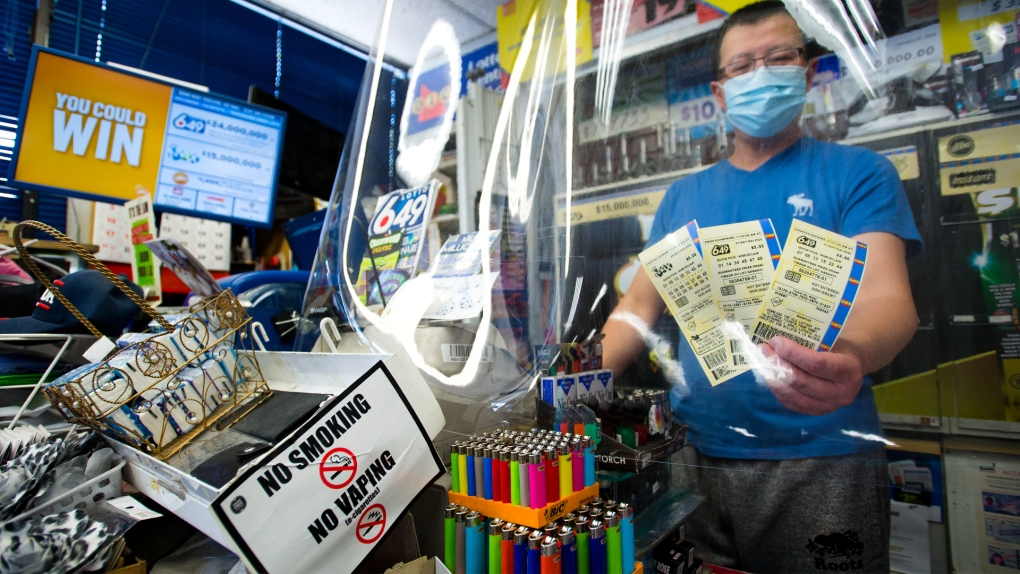Here's where Tuesday's $60M Lotto Max ticket was sold in Ontario
 A convenience store owner hands OLG 649 and Lotto Max tickets at his store during the COVID-19 pandemic in Mississauga, Ont., on Monday, May 25, 2020. Premier Doug Ford's government gives $500M loan to Ontario Lottery and Gaming. THE CANADIAN PRESS/Nathan Denette
A convenience store owner hands OLG 649 and Lotto Max tickets at his store during the COVID-19 pandemic in Mississauga, Ont., on Monday, May 25, 2020. Premier Doug Ford's government gives $500M loan to Ontario Lottery and Gaming. THE CANADIAN PRESS/Nathan Denette
Someone in Ontario woke up $60,000,000 richer Wednesday morning after winning Tuesday's Lotto Max draw.
According to Tony Bitonti with the Ontario Lottery and Gaming Corporation, the winning ticket for Tuesday's Lotto Max draw was sold in Richmond Hill, Ont.
There were also two second-prize tickets sold, each worth $121,440, Bitonti told CTV News Toronto. One was sold in Ottawa, and the other in North York.
No Maxmillion winners were announced in Ontario Wednesday.
Last week, Mississauga resident Jeffrey Gurczenski, 64, won $150,000 playing The Bigger Spinner game, and it was the second time he'd hit the jackpot in just one year. A few months prior, he won nearly $100,000 in Poker Lotto.
The jackpot for the next draw on Dec. 2 will be an estimated $15 million.
WHAT TO DO IF YOU WIN THE LOTTERY
lf you find yourself with a winning ticket, Pattie Lovett-Reid, former chief financial commentator for CTV News, has some advice.
Lovett-Reid's first tip is to resist telling anyone, at least not right away.
“Family, friends, charities, they all come knocking, and you may be unprepared in terms of how to respond,” she said. “That doesn’t mean that you don’t respond and you don’t give, because I think you do. I also think you get to spend, but you need to know what to save. So you have to have a plan.”
Lovett-Reid said a big lottery win, or any sudden windfall, should be followed up with a call to a lawyer, accountant or financial adviser.
She also suggests three simple rules: spend some, give some, and save some.
With files from CTV Northern Ontario's Mike McDonald
CTVNews.ca Top Stories

Bodies found by U.S. authorities searching for missing B.C. kayakers
United States authorities who have been searching for a pair of missing kayakers from British Columbia since the weekend have recovered two bodies in the nearby San Juan Islands of Washington state.
'It's discriminatory': Individuals refused entry to Ontario legislature for wearing keffiyeh
Individuals being barred from entering Ontario’s legislature while wearing a keffiyeh say the garment is part of their cultural identity— and the only ones making it political are the politicians banning it.
Tom Mulcair: Park littered with trash after 'pilot project' is perfect symbol of Trudeau governance
Former NDP leader Tom Mulcair says that what's happening now in a trash-littered federal park in Quebec is a perfect metaphor for how the Trudeau government runs things.
Saskatchewan households will continue to receive carbon tax rebate: Trudeau
Households in Saskatchewan will continue to receive Canada Carbon Rebate payments, despite the province refusing to remit natural gas levies to the federal government, Prime Minister Justin Trudeau said Tuesday.
'It's just so hard to let it go': Umar Zameer still haunted by death of Toronto police officer
'We hoped for this day, but we were scared that it would not never ever come because it took so long.' That’s what Umar Zameer, the man recently acquitted in the death of a Toronto police officer, told CTV News Toronto in a sit-down interview on Tuesday.
Senate expenses climbed to $7.2 million in 2023, up nearly 30%
Senators in Canada claimed $7.2 million in expenses in 2023, a nearly 30 per cent increase over the previous year.
Canucks goalie Thatcher Demko won't play in Game 2
The Vancouver Canucks will be without all-star goalie Thatcher Demko when they face the Nashville Predators in Game 2 of their first-round playoff series.
Pedestrian, baby injured after stroller struck and dragged by vehicle in Squamish, B.C.
Police say a baby and a pedestrian suffered non-life-threatening injuries after a vehicle struck a baby stroller and dragged it for two blocks before stopping in Squamish, B.C.
North Bay doctor accused of assaulting patient, threatening another
A North Bay doctor is facing charges after allegedly assaulting a patient with a weapon and threatening another person at the hospital, police say.
































